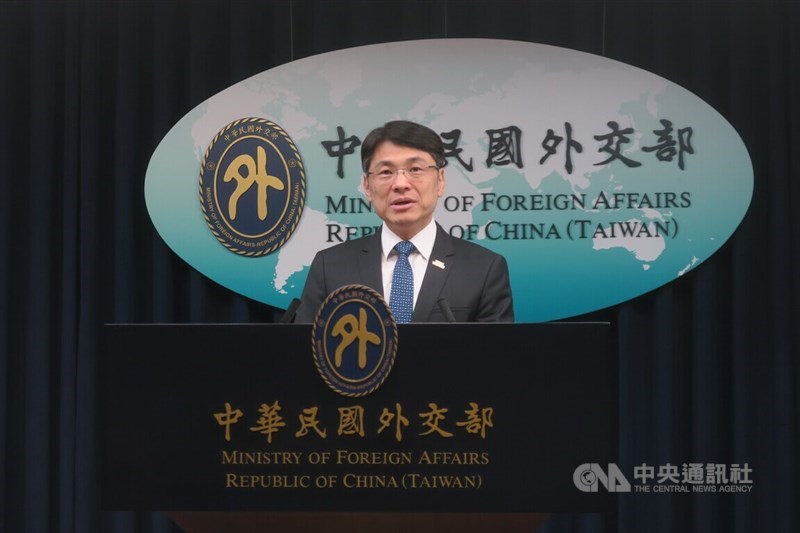Taiwan rebuts China's criticism of President Lai's National Day address

Taipei, Oct. 11 (CNA) Taiwan's government on Friday rebutted criticism from Chinese authorities of President Lai Ching-te's (賴清德) National Day address, saying that United Nations General Assembly Resolution 2758 does not determine Taiwan's status and urging Beijing to share responsibility for peace in the Taiwan Strait.
In a Friday speech marking the Republic of China's (ROC, Taiwan's official name) 114th National Day, Lai urged China to "take responsibility as a major power and cease its distortion of U.N. General Assembly Resolution 2758 and historical World War II documents."
Resolution 2758, adopted in 1971, addresses the issue of China's seat in the U.N. by recognizing the People's Republic of China (PRC) as the only legitimate representative of China and expelling the representative of then ROC President Chiang Kai-shek (蔣介石), who had up until that point represented China.
It has been used by Beijing to justify its "One China Principle" which claims Taiwan as part of its territory, but Taiwan has criticized that view as a distortion of what Resolution 2758 says.
Following Lai's speech on Friday morning, Guo Jiakun (郭嘉昆), spokesperson of China's Foreign Ministry said later in the day that Lai repeated the "same old fallacies for 'Taiwan independence,'" and distorted and challenged historical facts and international consensus.
"International legal instruments, including the Cairo Declaration, the Potsdam Proclamation, and the Japanese Instrument of Surrender, have affirmed China's sovereignty over Taiwan," Guo said at a regular press conference in Beijing.
The three documents Guo cited were issued or signed in 1943 (the Cairo Declaration) and 1945 (the Potsdam Proclamation and the Japanese Instrument of Surrender) -- years before the PRC was founded in 1949 -- by Allied leaders or representatives, including Chiang.
"Once and for all, U.N. General Assembly Resolution 2758 resolved, politically, legally and procedurally, the issue of the representation of the whole of China, including Taiwan, at the U.N.," Guo added.
The Chinese diplomat said that any attempt to "tamper with historical facts or challenge Resolution 2758" would constitute a challenge to "China's sovereignty and territorial integrity, the U.N.'s authority and the post-war international order."
On Friday evening, Taiwan's Ministry of Foreign Affairs (MOFA) said in a news release rebutting its Chinese counterpart that the Treaty of San Francisco, which came into force in 1952, carries international legal force that superseded wartime political declarations such as the Cairo Declaration and the Potsdam Proclamation, and "did not hand over Taiwan to the PRC."
"The PRC has never governed Taiwan for a single day and has no authority to represent Taiwan in the international community," the MOFA said.
The ministry said it strongly opposes the PRC's "continued, malicious distortion of U.N. General Assembly Resolution 2758 to force the international community to accept its claims and to exclude Taiwan from the U.N. system."
"It is widely known that the resolution concerns only China's representation at the U.N., makes no mention of Taiwan, and does not address Taiwan's status, nor does it authorize China [referring to the PRC] to represent Taiwan," the statement read.
Similar exchanges also occurred on Friday between China's Taiwan Affairs Office (TAO) and Taiwan's Mainland Affairs Council (MAC) -- the government agencies primarily responsible for cross-strait affairs -- after Lai's speech.
TAO spokesperson Chen Binhua (陳斌華) said in a statement that Lai "stubbornly adhered to a 'Taiwan independence' stance and hyped a 'mainland threat,'" while seeking independence by force.
He also criticized Lai for "expanding the military and preparing for war," referring to the president's emphasis on defense in his speech, including his first-time vow to build a multi-layered "T-Dome" air-defense system.
"His words and actions will only undermine peace and stability across the Taiwan Strait and heighten tensions," Chen said.
The MAC issued a news release later that evening rejecting its Chinese counterpart's claims, saying that in the face of global changes, Taiwan has strengthened its resolve to defend itself and is taking "necessary measures to safeguard national sovereignty and ensure sustainable prosperity."
Citing frequent incursions into Taiwan's Air Defense Identification Zone (ADIZ) by Chinese military aircraft and vessels to "intimidate the Taiwanese public," the council said Beijing's military expansion has repeatedly stirred up trouble in the East China Sea, the Taiwan Strait, and the South China Sea, "making it a troublemaker in the Indo-Pacific."
"We hope that the Chinese side will act as a responsible major power and jointly safeguard peace and stability in the Indo-Pacific," the MAC added.
-
Politics
Two Taiwanese stranded in Israel amid conflict reach Jordan
03/02/2026 09:02 PM -
Business
124,000 Taiwanese have at least NT$100 million in assets: Report
03/02/2026 08:53 PM -
Society
Rain, cooler weather expected across Taiwan on Lantern Festival
03/02/2026 08:13 PM -
Society
Iran conflict to 'severely' delay Taiwan mail to 17 countries
03/02/2026 06:32 PM -
Cross-Strait
Iran could cloud Trump-Xi talks but unlikely to spark Taiwan war: Scholars
03/02/2026 06:13 PM